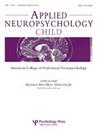评估 3 岁前后人工耳蜗植入年龄对实用能力的影响。
IF 1.4
4区 心理学
Q4 CLINICAL NEUROLOGY
引用次数: 0
摘要
引言 人工耳蜗(CI)对重度听力损失(HL)儿童的听力、言语、语言和沟通能力的发展至关重要。本研究旨在评估儿童接受 CI 的年龄如何影响那些在 3 岁之前或之后接受 CI 的儿童在 5 至 8 岁期间语用能力的发展。这些 5 至 8 岁的儿童被分为两组,分别在 3 岁之前或之后接受 CI。结果 3 岁以下植入 CI 的儿童在社交关系、语境使用、对话默契、句法和言语方面得分更高。此外,他们在不恰当会话和刻板会话中的表现也优于 3 岁以上的儿童。除了连贯性和兴趣(P < 0.05)外,他们在语用综合能力方面与 3 岁以上接受 CI 的儿童相比有明显差异。这些结果表明,早期 CI 非常重要。当然,还必须考虑其他个人和环境因素。本文章由计算机程序翻译,如有差异,请以英文原文为准。
Evaluating the effect of cochlear implantation age on pragmatic abilities before and after age of 3.
INTRODUCTION
The cochlear implant (CI) is crucial in developing hearing, speech, language, and communication skills in children with profound hearing loss (HL). The study aimed to assess how the age at which children receive a CI affects the development of pragmatic abilities between the ages of 5 and 8 for those who received a CI before or after the age of 3.
METHODS
Forty children with CI were evaluated. The children between the ages of 5 and 8 were divided into two groups who received CIs before or after age 3. The Persian version of the Children's Communication Checklist (CCC) was used to assess pragmatic abilities with a parent rating scale.
RESULTS
Children implanted under 3 got higher scores in social relationships, using context, conversational rapport, syntax, and speech. Also, their performance in inappropriate and stereotyped conversations was better than those over 3 years. They have a significant difference in the pragmatic composite than those who received CI over 3 except for coherence and interest (p < 0.05).
CONCLUSION
According to the results, children with CI under 3 performed better in pragmatic composites, which means they have better pragmatic abilities. These findings suggest that early CI is important. Of course, other individual and environmental factors must also be considered.
求助全文
通过发布文献求助,成功后即可免费获取论文全文。
去求助
来源期刊

Applied Neuropsychology: Child
CLINICAL NEUROLOGY-PSYCHOLOGY
CiteScore
4.00
自引率
5.90%
发文量
47
期刊介绍:
Applied Neuropsychology: Child publishes clinical neuropsychological articles concerning assessment, brain functioning and neuroimaging, neuropsychological treatment, and rehabilitation in children. Full-length articles and brief communications are included. Case studies of child patients carefully assessing the nature, course, or treatment of clinical neuropsychological dysfunctions in the context of scientific literature, are suitable. Review manuscripts addressing critical issues are encouraged. Preference is given to papers of clinical relevance to others in the field. All submitted manuscripts are subject to initial appraisal by the Editor-in-Chief, and, if found suitable for further considerations are peer reviewed by independent, anonymous expert referees. All peer review is single-blind and submission is online via ScholarOne Manuscripts.
 求助内容:
求助内容: 应助结果提醒方式:
应助结果提醒方式:


